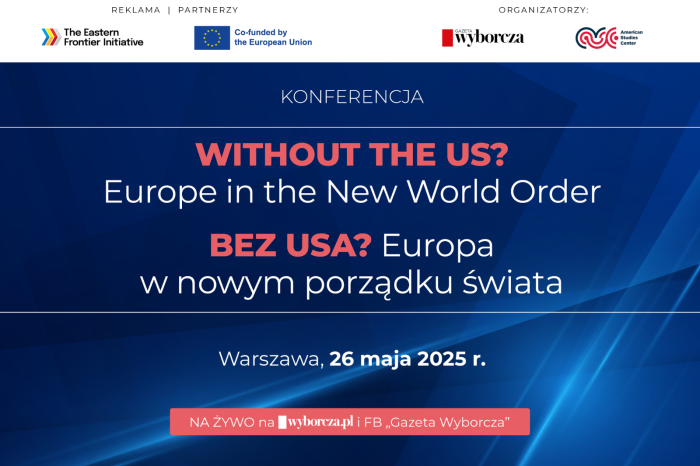Together with Gazeta Wyborcza we are delighted to invite you to the whole-day conference “Without the US? Europe in the New World Order” concerning the first months of Donald Trump’s second term and its impact globally and in our part of the world. We will reevaluate past assessments, revise potential scenarios, and parse through options that lay ahead of us regarding European security, civil liberties in the age of globalized political polarization, and media freedom. Invited guests include ASC professors, journalists, and experts from think tanks.
Monday, May 26, 2025
room 0.410.
The event will consist of three panels (two in Polish and one in English.)
Attendance at each panel is worth 3 OZN points.

Event Schedule
9:30-9:40 | Opening remarks – Dr hab. Paweł Frelik, prof. ucz. (ASC UW) and Bartosz Wieliński (GW)
9:40-10:55 | Panel 1 (in Polish)
Pierwszy semestr Donalda Trumpa. Czy Europa jest bezpieczna?
Prof. Bohdan Szklarski, political scientist (ASC UW)
Dr Agnieszka Bryc, political scientist (Faculty of Political Science and Security, UMK)
Moderator: Bartosz Wieliński (“Gazeta Wyborcza”)
11:10-12:25 | Panel 2 (in Polish)
Wolności obywatelskie i prawa człowieka w dobie globalnej polaryzacji politycznej
Natalia Waloch, journalist (“Wysokie Obcasy,” “Gazeta Wyborcza”)
Dr hab. Agnieszka Graff, prof. ucz. (ASC UW)
Mateusz Piotrowski (American Program coordinator, Polish Institute for Foreign Affairs)
Moderator: Dr Jan Smoleński (ASC UW)
12:40-1:55 | Panel 3 (in English)
Media freedom under fire
Dr Ian Garner (The Center for Totalitarian Studies, Pilecki Institute)
Balázs Kaufmann, senior journalist and video reporter at 444.hu
Lukáš Onderčanin, (foreign desk chief, “SME”)
Moderator: Bartosz Wieliński
The event is co-organized by Gazeta Wyborcza and American Studies Center at UW with Leadership Research Group and Political, Social and Cultural Polarization Research Group.




